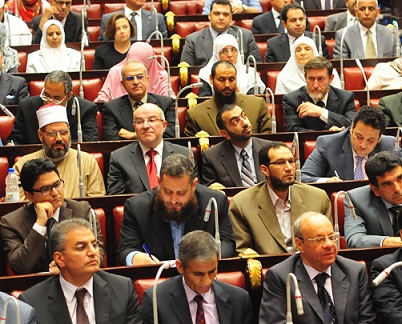By Ibrahim Al-Masry

The disagreement over certain controversial articles within the draft constitution appeared to be close to resolution following a meeting on Tuesday between Islamist and civil parties, according to Farid Ismail, a member of the Constituent Assembly’s drafting committee.
The Free Egyptians Party, the Egyptian Social Democratic Party (ESDP) and the Popular Current have announced their rejection of the draft constitution. The Free Egyptians party said the party didn’t sign any agreements or take part in any negotiations.
Ismail said the parties at the meeting agreed to remove from the draft the article stating that gender equality should be maintained in accordance to Islamic Shari’a, since Article 2 of the draft already states that Shari’a is the main source of legislation. The parties also agreed to remove the controversial human trafficking article, claiming the issue to be adequately covered by a separate article covering all forms of human exploitation.
An article preserving the “freedom of exercising religious rituals and building worship according to the law” was added to the draft. It is unclear whether this article will apply to religions other than Islam, Christianity and Judaism.
The assembly’s system of governance committee resumed its pre-final draft revision yesterday. Committee member Sha’ban Abdel Aleem said two versions of the article regarding the Shura Council will be voted on; one article keeps the council with its current name and jurisdiction while the other amends it. Abdel Aleem further added there will be a vote to choose between a system of elected local councils and a dual system which would include popular and executive councils.
The parties at Tuesday’s meeting agreed to keep the article which gives the president the right to dissolve parliament should it repeatedly veto a cabinet formation. The system of governance committee had previously rejected this article.
The section on independent and regulatory bodies was amended following the meeting. The amended version states that the anti-corruption authority will implement the state’s strategies as well as prevent conflicts of interest instead of just coordinating between other bodies that instead carry out these functions.
Forensics and notary officials will now have their own independent agencies. The National Electoral Commission will be composed of six members, two from each of the State Council Chairman’s deputies, Cassation Court Chairman’s deputies and the deputies of chairmen of appeals courts.
The defence and National Security Committee rapporteur in the assembly, Mohamed Mohey, denied that the draft constitution limits the powers of judicial bodies, either the courts or the prosecution. He said the constitution ensures the independence of the judiciary with only the constitution and the law as its superiors and that no one can remove judges from office.
Several human rights organisations, legal experts and the Supreme Council of the Judiciary have criticised the lack of clarity regarding the role of the judiciary in the draft. Mohey dismissed the criticism that the Constituent Assembly neglected to implement the council’s demands, arguing that the assembly is the founding authority and that it makes the rules for all other branches of government and not the other way round.


